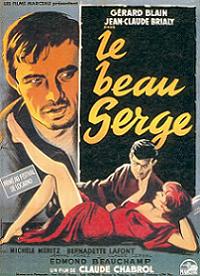Le Beau Serge
| Le Beau Serge | |
|---|---|

Film poster
|
|
| Directed by | Claude Chabrol |
| Produced by | Claude Chabrol |
| Written by | Claude Chabrol |
| Starring |
Jean-Claude Brialy Gérard Blain |
| Music by | Émile Delpierre |
| Cinematography | Henri Decaë |
| Edited by | Jacques Gaillard |
|
Release date
|
|
|
Running time
|
99 minutes |
| Country | France |
| Language | French |
| Budget | FFR 37,000,000 |
Le Beau Serge (French pronunciation: [lə bo sɛʁʒ], meaning "Handsome Serge") is a French film directed by Claude Chabrol, released in 1958. It has been cited as the first product of the Nouvelle Vague, or French New Wave, film movement. The film is often compared with Chabrol's subsequent film Les Cousins, which also features Jean-Claude Brialy and Gérard Blain.
François (Jean-Claude Brialy), a successful yet sickly young man, returns to his home town Sardent after a long absence. He finds his friend Serge (Gérard Blain) who has become a wretched alcoholic, unsatisfied with his life in the village. Serge had hoped to leave the village to study, but had to stay to marry Yvonne after she was pregnant. The death of their stillborn child did not help. (Serge has become an angry, bitter figure not unlike the roles of James Dean, refusing to face reality and adulthood.) At the time of arrival of François, Yvonne is again pregnant. François finds himself on the one hand at odds with the provincial village life and on the other hand compelled to help Serge. The fact that they are both entangled in affairs with Marie (Bernadette Lafont) makes things more complicated. At the end, the birth of Serge and Yvonne's second child seems to provide a slight possibility of success.
Chabrol had originally intended to shoot Les Cousins first, but due to its Paris setting, it would have been twice as expensive to film. He chose instead to shoot in Sardent, a village where his mother lived before moving to Paris and where he often spent the summer with his grandmother. The film was shot over nine weeks in the winter of 1957-8 on a budget of 32 million old francs. It was financed from his first wife's inheritance. The film initially ran to 2 hours and 35 minutes, though Chabrol cut a great deal of quasi-documentary material to reduce the running time, a decision he later regretted.
...
Wikipedia
